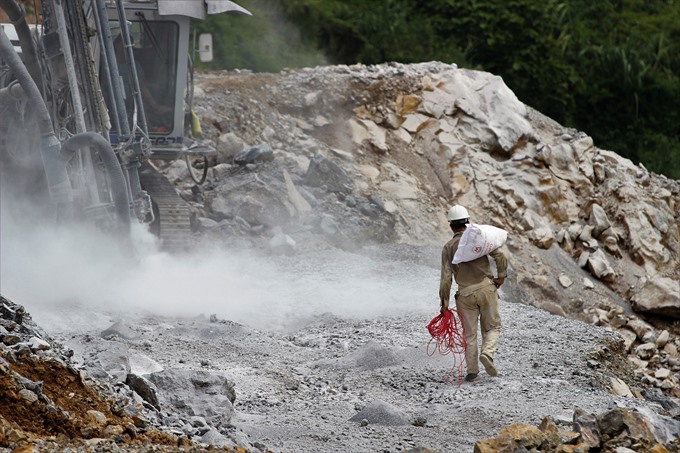 Society
Society

No one wants to risk their lives for a life threatening job. However, a number of residents from the northern province of Hòa Bình still engage to the job as they are so poor.
 |
| Local residents carry explosives to blast rock. — Photo Lãng Quân - Tâm Ninh |
Lãng Quân - Tâm Ninh
HÒA BÌNH — Residents of Cao Dương Commune in Hòa Bình Province call the stone quarries scattered around their modest homes "death valley". The name reflects reality. Residents say at least six miners died this year while working at the mines, where employers exploit both stone and workers.
The image of workers standing precariously at the top of quarries, drilling without protective equipment, is a familiar one. So are residents carrying bags of explosives to the top of the mountain.
Mine owners, for their part, often hire cheap labour and ignore safety regulations in order to extract as much stone as possible and maximise profits. They know their employees need to make a living and have no other work.
When an accident occurs, the mine owners pay compensation to the worker’s relatives, sums that are still likely lower than what proper safety precautions would cost them.
Bùi Thị Nga, 62, whose son Bùi Văn Khôi, 29, died in a mining accident at Quarry 9 run by Thạch Kim One Member Ltd Co, sits crying in her dilapidated house. “The night before the day he fell off the mountain, I told him to find another job as it was too dangerous. But he refused, saying he was about to get married and needed the money,” she said.
She could not do anything except tell him to be careful, Nga said. “I don’t care how much compensation mine owners give to me. I just want my son alive,” she said, adding that they had promised to pay her about VNĐ200 million (US$8,800).
Daily bread
Bùi Minh Biện, chairman of the Cao Dương Commune People’s Committee, said that accident victims were transported to hospitals and mine owners often promise the relatives compensation to keep them quiet. He said the commune is home to 12 mines.
There are around 100 stone mines operating in Hòa Bình with licences for 20 to 30 years. Most are concentrated in Lương Sơn District.
Nguyễn Văn Dũng, a resident of Cao Dương Commune in Lương Sơn District, said he remembers the first day he worked at a stone mine. After being given plastic construction hats, Dũng and other villagers climbed to the top of the mountain and started to drill without any safety equipment.
“Our job is a very dangerous one. We might lose our lives but we must carry on because of daily bread,” Dũng said. It was normal to see local residents carrying explosives to blast rock, he added.
Only after his brother, Nguyễn Văn Tùng, died at the age of 22 after falling from a mine just in front of their house, did Dũng decide to quit.
Bùi Thị Mến, wife of Bùi Văn Chẻng, who died last week at Quarry 9, said: “When my husband fell off the mountain, he was not equipped with protective rope or hat.”
Bùi Văn Lung, Chẻng’s brother in law, who witnessed his death, said he had to drink wine every day to forget his misery and trauma.
The manner in which mine owners treat the victims’ relatives also deepens their pain. After the death of Nguyễn Văn Thiếu, 43, mine owners tried to bargain over the compensation.
“At first they offered VNĐ120 million, then VNĐ140 million, VNĐ150 million and VNĐ180 million finally,” said Quách Thị Hòa, Thiếu’s aunt.
Loose management
“My husband worked at the mine for a year, but the mine owners did not buy occupational accident insurance for him,” said Nguyễn Thị Mơ, Thiếu’s wife.
Just a month after that, Nguyễn Văn Đạo, his brother-in-law, was also killed in a mining accident. Đạo’s families received VNĐ150 million ($6,600) in compensation.
The difference in compensation was attributed to the fact that Đạo’s children were older than Thiếu’s.
Biện, chairman of Cao Dương Commune, blamed the accidents on loose management.
“Because mine owners know inspection dates in advance, it isn’t easy for inspectors to detect violations,” he said.
Trần Tố Chinh, deputy head of Hòa Bình Province’s Department of Construction, said an inspection team from the Ministry of Construction last year found 43 out of 96 mines didn’t meet regulations on labour safety. Mine owners were asked to make a road which is big enough for workers and vehicles to operate on.
Punishments had been imposed on violators, however, no inspection has been conducted since then, she said. — VNS




